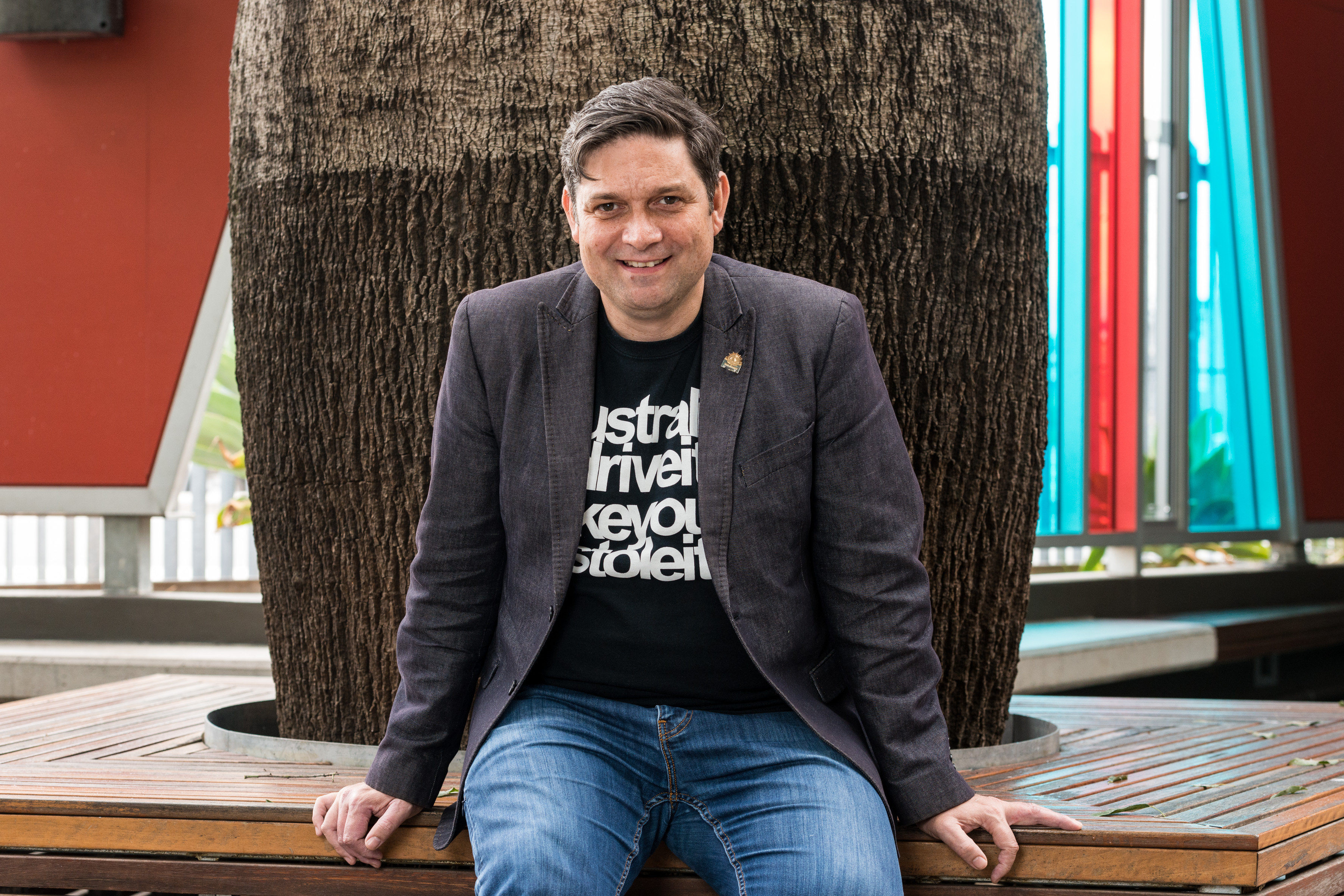Internationally acclaimed playwright and artistic director Wesley Enoch AM announced as Indigenous Chair in the Creative Industries with QUT.
- Writer/director Wesley Enoch appointed Indigenous Chair in the Creative Industries with QUT
- Enoch will use the role to contribute to the national conversation on global issues including climate change, aged care, technology and human rights
- A substantial donation from philanthropist Greg Creed allows QUT to establish the Chair
Aged care, climate change, human rights, making technology more accessible, responding to COVID-19 and encouraging every Australian to care for Country are all on the agenda for internationally acclaimed playwright and artistic director Wesley Enoch AM when he begins his new role next week as Indigenous Chair in the Creative Industries with QUT.
"Indigenous culture should be part of the national and international conversation around global issues like climate change, healthcare, human rights and more. I will be using my new position to bring it to the table across as many forums as possible," said Enoch, who was born on Minjerribah (Stradbroke Island).
"Aged care is a good example. In Indigenous culture, older people are 'Elders of our community' and that should be the case for everyone no matter their heritage. They are the living libraries of our history and ways of living, not faceless numbers in a profit-making system. They should be cared for and respected."

Enoch returns to Brisbane following five years as Sydney Festival Director and a period as a Director at Sydney Theatre Company – his latest production, Appropriate, has just opened.
QUT Vice-Chancellor and President Professor Margaret Sheil said businessman, philanthropist and QUT's 2014 Outstanding Alumnus, Mr Greg Creed, made a substantial donation to establish the position.
"As Indigenous Chair for the Creative Industries, Wesley will lead the way in a national conversation on the place of Indigenous Australia within the creative industries through the unique First Nations perspective on learning, teaching and research, and in so doing, foster career pathways and opportunities for students and professionals within the wider community.
"Our goal is to shift public perceptions, offer independent thought leadership and influence national public debate."
Professor Sheil said the position would sit within QUT's Creative Industries precinct at the Kelvin Grove Campus, reporting to Professor Lori Lockyer Executive Dean, Creative Industries and Angela Leitch, the Pro-Vice Chancellor (Indigenous Strategy). He will also work closely with the Carumba Institute, the central research platform for QUT's commitment to Indigenous Australians.
"Our arts organisations have suffered from reduced funding over the past two decades, and are under more political pressure, but universities are still about the pursuit of knowledge and not under the same scrutiny," said Mr Enoch.
"While thought and cultural leadership in the arts are under assault in Australia, universities are able to invest in knowledge and experience. QUT taught me to be a thinking artist with a global perspective. You can be influential from anywhere, including Brisbane.
"I am at a stage where I am thinking about what I want to devote myself to for the next decade and this role allows me to pursue my ambitions On Country. It is important to focus on the next generation and make sure storytelling can flourish.
"Poet, political activist, artist and educator, Oodgeroo Noonuccal, was my great aunt and also my greatest inspiration. My first professional acting job was in a play about her life – One Woman's Song – which premiered in the months before she passed away in 1993.
"Coming home and carrying on that legacy is an extraordinary opportunity for me to have at QUT."
Mr Creed added his donation was motivated by his strong view the QUT Indigenous Chair in the Creative Industries was a much-needed platform to amplify Indigenous perspectives across teaching, learning, research and community.
"Privilege is invisible to those who have it. Together, we can elevate and amplify Indigenous perspectives and ensure they always have a seat at the table," said Mr Creed.
"This is a personal issue for all Australians. Amplifying Indigenous perspectives can lift the whole country together."
WESLEY ENOCH AM - Writer / Director
Biography
Wesley Enoch has written and directed iconic Indigenous productions THE 7 STAGES OF GRIEVING, BLACK MEDEA and THE STORY OF THE MIRACLES AT COOKIE'S TABLE. He has directed productions of THE SAPPHIRES, BLACK DIGGERS, I AM EORA, THE MAN FROM MUKINUPIN, YIBIYUNG, PARRAMATTA GIRLS, and BLACK COCKATOO. He was the Artistic Director of the Sydney Festival from 2017 to 2020 and was previously the Artistic Director at Kooemba Jdarra Indigenous Performing Arts and the Ilbijerri Aboriginal Torres Strait Islander Theatre Co-operative. Wesley's other residencies include Resident Director at Sydney Theatre Company; Associate Artistic Director at Belvoir Street Theatre; the 2002 Australia Council Cite Internationale des Arts Residency in Paris and the Australia Council Artistic Director for the Australian Delegation to the 2008 Festival of Pacific Arts. He was creative consultant, segment director and indigenous consultant for the 2018 Gold Coast Commonwealth Games.






